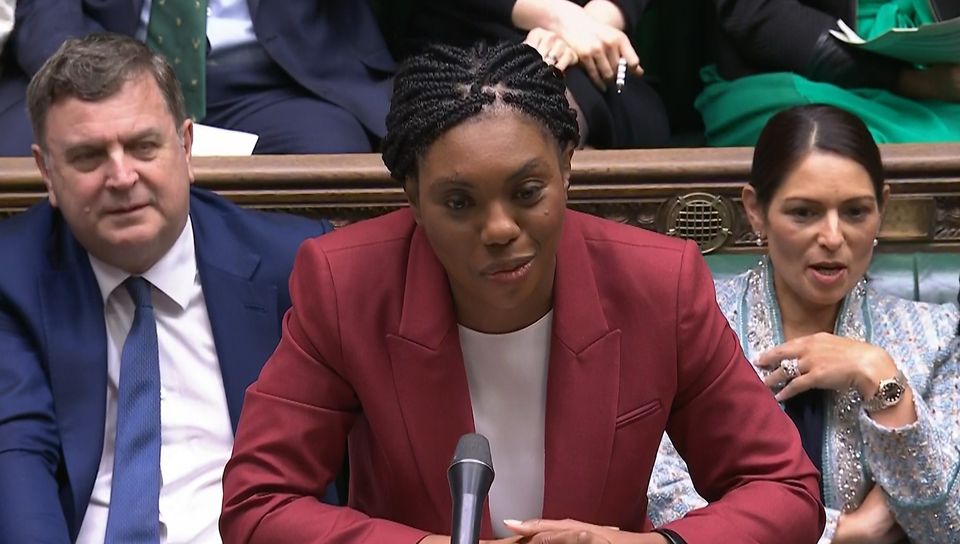Council tax bills in England are expected to increase by up to 5% next April, amid Tory warnings that local authorities face a £2.4 billion “black hole”.
Conservative Party leader Kemi Badenoch pressed Sir Keir Starmer to confirm whether the cap on council tax would be increased or not, with the Prime Minister sidestepping the question in the Commons.
Speaking after Prime Minister’s Questions, the Prime Minister’s press secretary told reporters that “the threshold remains the same”.
Conservative Party leader Kemi Badenoch speaking during Prime Minister’s Questions in the Commons (House of Commons/UK Parliament/PA)
Under current rules, councils can increase tax rates by up to 5% and require Government permission or a referendum to go beyond this figure.
Government statistics show the average band D council tax set by local authorities in England for 2024/25 was £2,171, which represented an increase of £106 or 5.1% on the previous year.
The main inflation figure fell to 1.7% in September although it is expected to rise again towards the end of this year, as energy costs go up over the winter.
Sir Keir accused the Tories of leaving local authorities in an “absolutely catastrophic state” after Mrs Badenoch pressed the PM about the Government’s funding plans for cash-strapped councils in England.
The Conservatives cited responses to written parliamentary questions in which ministers said estimated core spending power (CSP) for local government will increase from £64.7 billion in 2024/25 to £68.4 billion in 2025/26, with the party adding the Budget was not providing enough new funding to cover this.
Ministers have said the CSP is subject to data changes and final figures will be published as part of the 2025-26 local government finance settlement.
Speaking at PMQs, Mrs Badenoch asked: “Will the Prime Minister confirm that he will keep the cap on council tax?”
Sir Keir, in his reply, said: “On the question of councils, she knows what the arrangements are.”
Mrs Badenoch responded: “I think the House would have heard that the Prime Minister could neither confirm nor deny whether the cap on council tax was being raised.”
Mrs Badenoch went on to ask how much extra money local authorities will have to raise to cover the “social care funding gap” created by the Chancellor’s Budget and increases in employers’ national insurance.
Sir Keir, who had earlier answered a question from Liberal Democrat MP Christine Jardine (Edinburgh West) on healthcare funding, replied: “It’s all very well this knockabout but not actually listening to what I’ve said three minutes ago is a bit of a fundamental failure of the Leader of the Opposition.
“I just said £600 million. I repeat it: £600 million.”
Mrs Badenoch later said: “The Prime Minister probably does not realise that, on Monday, the Ministry for Communities, Local Government and Housing revealed that councils will need to find an additional £2.4 billion in council tax next year. That is a lot more than £600 million.
“I know that he has been away, but did the Deputy Prime Minister (Angela Rayner) who runs that department make him aware of their £2.4 billion black hole?”
Sir Keir replied: “Let me get this straight, she doesn’t want any of the measures in the Budget, but she wants all the benefits.
“So the magic money tree is back after two weeks in office. They’ve learned absolutely nothing. We put forward a Budget which takes the difficult decisions, fixing the £22 billion black hole that they left, investing in the future of our country.
“They say they want all of that, but they don’t know how they’re going to pay for it – same old Tories.”
Mrs Badenoch accused the Government of having “fiddled the fiscal rules” before highlighting how the rise in employers’ national insurance would be a “disaster” for small businesses.
The Opposition leader later said: “Their ideological Budget was designed to milk the private sector and hope nobody would notice.
“Now his Cabinet ministers are all queuing up for public sector bailouts to his tax mess. If he is going to bail out the public sector then can he tell us this: does he think it is appropriate – as the Ministry for Housing has done – to approve a four-day week for councils that is not flexible working, but is actually part-time work for full-time pay?”
Sir Keir replied: “Questions based on what we’re actually doing are usually better than fantasy questions made up.
“What did they deliver in 14 years? Low growth, a stagnant economy, a disastrous mini budget, a £22 billion black hole and now she wants to give me the advice on running the economy?
“I don’t want to be rude but no thank you very much.”
The Government last week dropped official concerns about South Cambridgeshire District Council’s four-day week after the authority faced opposition from the previous Tory administration.
